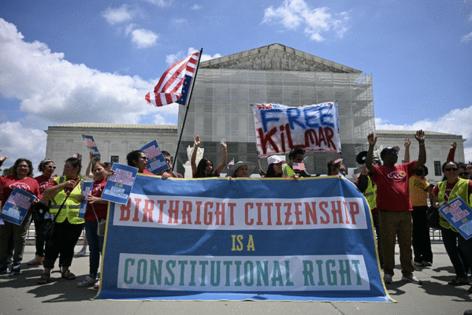4 takeaways from birthright citizenship arguments before the Supreme Court
Published in Political News
WASHINGTON — The Supreme Court on Thursday probed the Trump administration’s pursuit to end birthright citizenship by asking justices to limit the reach of lower court judicial injunctions.
The arguments in Donald J. Trump v. CASA, et al. stem from an executive order seeking to stop granting citizenship to children born in the United States to noncitizen parents. While the constitutionality of the order is not at the heart of this case, the justices’ questions touched on both procedural and substantive aspects of the debate, which could reshape the balance of power between the branches of government.
A ruling is expected by early July.
Here are four takeaways from Thursday’s hearing.
Nationwide injunctions earn scrutiny
Conservative justices questioned the breadth of nationwide injunctions, asking whether a single district judge should wield the power to halt a federal policy across the entire country, as many have during the early months of the second Trump administration.
Multiple district courts issued nationwide injunctions blocking the implementation of Trump’s executive order on birthright citizenship, leading to a string of appeals and the current Supreme Court review. The Trump administration has been hobbled by a proliferation of such injunctions during the first four months of its term, leading conservatives to see them as a political tool increasingly wielded against Republicans.
“We survived until the 1960s without universal injunctions,” Justice Clarence Thomas offered.
On the other side, Justice Ketanji Brown Jackson argued that universal injunctions help move the system as quickly as possible to the root of the core policy issue. In this case, that’s how to define U.S. citizenship.
“It seems to me that when the government is completely enjoined from doing the thing it wants to do, it moves quickly to appeal that to get it to the Supreme Court, and that’s actually what we would want,” she said.
Kelsi Corkran, an attorney for immigrant rights organizations, argued that justices could choose a middle ground: Allowing for universal injunctions only when a fundamental constitutional right is being challenged.
Allowing some states to restrict birthright citizenship could prove chaotic
The states and groups challenging the Trump administration stressed that limiting injunctions to only those who bring lawsuits would result in a confusing and unjust system where a child’s citizenship status could depend on their location by a few miles.
What’s more, they argued, is that if the court chooses to limit relief to a plaintiff in New Jersey, the state would still be overburdened by the fallout in neighboring states.
“In New Jersey, we have 6,000 babies born out of state every year. When they come into the state and they need benefits ... we have to do citizenship verifications, which is a burden for us,” said Jeremy Feigenbaum, New Jersey’s solicitor general. “It will undermine the administration of our benefits programs.”
Liberal justices repeatedly raised doubts about the feasibility of enforcing immigration and citizenship laws if some states can rescind birthright citizenship.
“Are we really going to have a situation where a child born in Texas is a citizen, but one born in Arizona is not?” asked Justice Elena Kagan.
Roberts, Barrett and Gorsuch are seen as key swing votes
Two conservative justices — John Roberts and Amy Coney Barrett — are seen by veteran court observers as the most likely swing votes in the birthright citizenship case.
Both have previously prioritized long-term legitimacy and stability of the court over rigid ideological outcomes.
The high court’s three-person, all-female liberal wing is expected to support maintaining nationwide injunctions in cases impacting fundamental rights, likely leaving Roberts and Barrett with a decision of whether to break from their conservative colleagues on the 14th Amendment.
Barrett, who at one point defended Kagan’s line of questioning, grilled the Trump administration’s solicitor general on following judicial precedent.
“You’re saying you would respect the judgment, but not necessarily the opinion of a lower court?” Barrett asked Solicitor General Dean John Sauer.
Sauer said that doing so was not a “categorical practice.”
“This could be a nail-biter,” posted law professor and legal analyst Jonathan Turley. “I think that the administration still has an advantage in curtailing universal injunctions. However, I did not come away with the sense of a lock with a majority, particularly given Barrett’s questions.”
Turley also said he was unsure how to evaluate where Roberts and Justice Neil Gorsuch stand based on their lines of questioning.
The Supremes mostly sidestepped the core issue — for now
While the media’s glare is on birthright citizenship, the justices carefully avoided a direct judgment on the 14th Amendment’s Citizenship clause on Thursday.
Instead, they framed the case around the technical — but consequential — issue of judicial remedies and their scope.
That concerted restraint among the justices signaled the court’s strategic posture: settling process before principle, and possibly setting the stage for a future, higher-stakes showdown over who is entitled to U.S. citizenship by birth.
_____
©2025 McClatchy Washington Bureau. Visit mcclatchydc.com. Distributed by Tribune Content Agency, LLC.



























































Comments